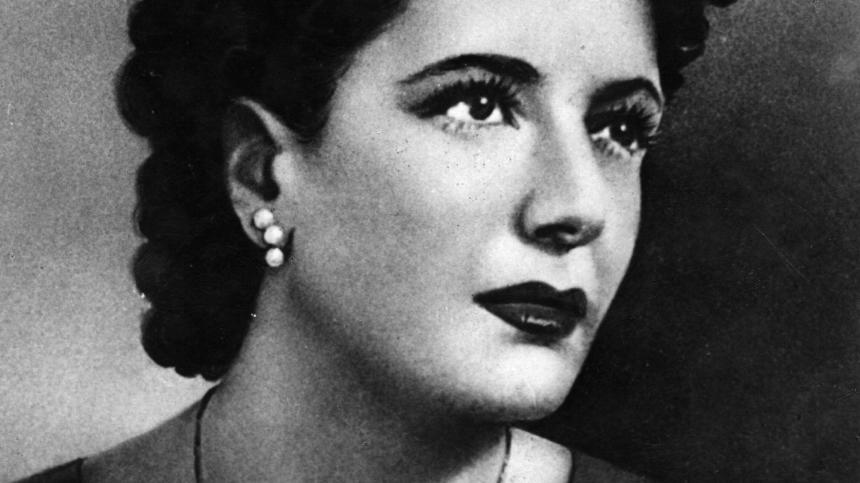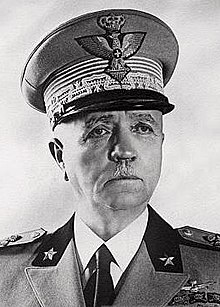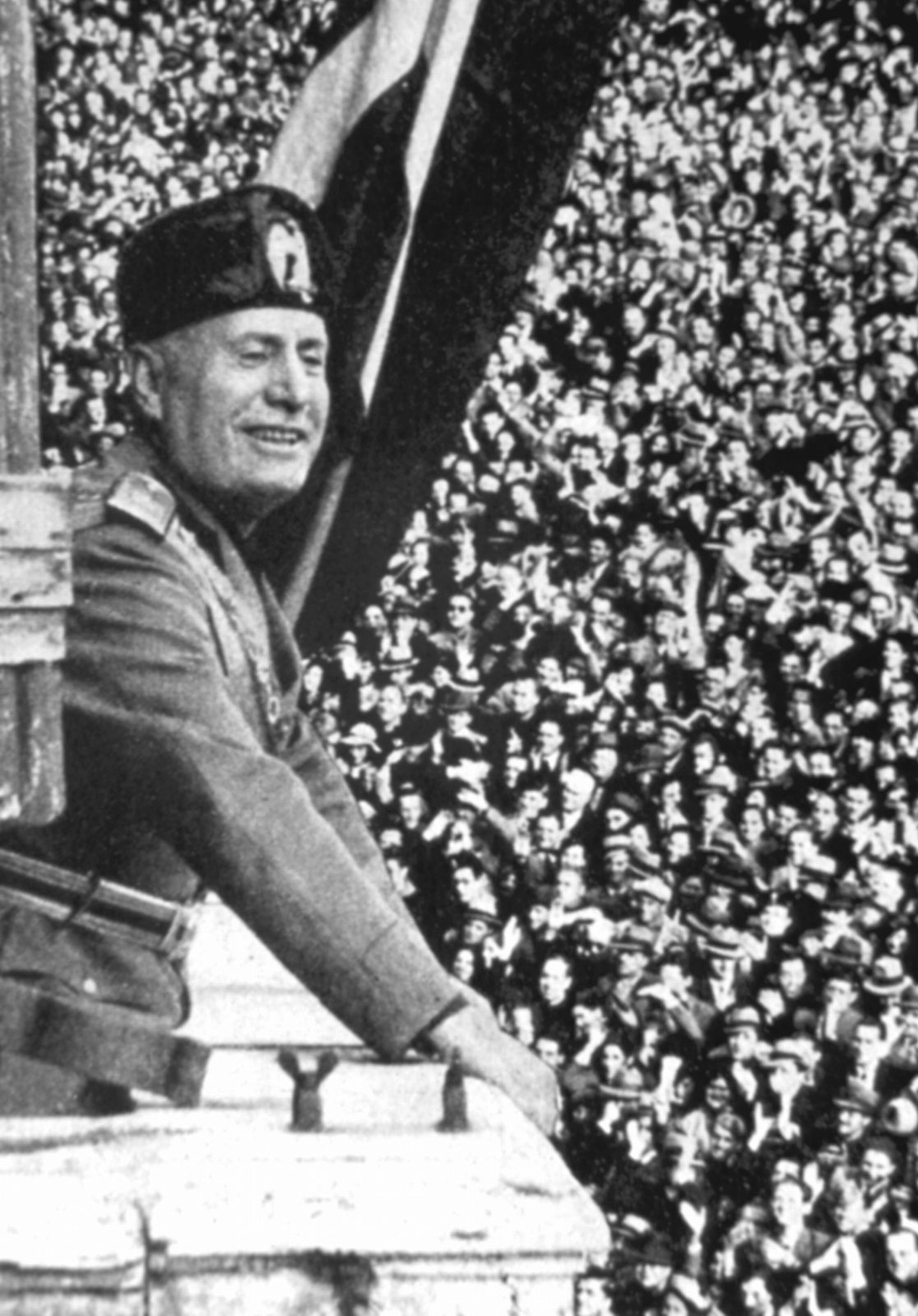from TIME-LIFE series “Italy At War”
Within months of Italy’s entry into War , flaws in the structure of Fascism became so evident that a classified Italian police report spoke bluntly of the progressive degeneration of the state. The mammoth party machinery was too unwieldy to respond to crisis , and too conformist to seek new solutions to problems the country had never before faced. Rivalries and jurisdictional disputes increasingly splintered the party hierarchy. Corruption was so widespread that said one senior poliçe official , the term gerarca (Fascist Leader) was used as a synonym for “thief”. Italian Army , Italian Navy and Air Force squabbled and plotted among themselves , going so far as to spy on oneanothers activities.
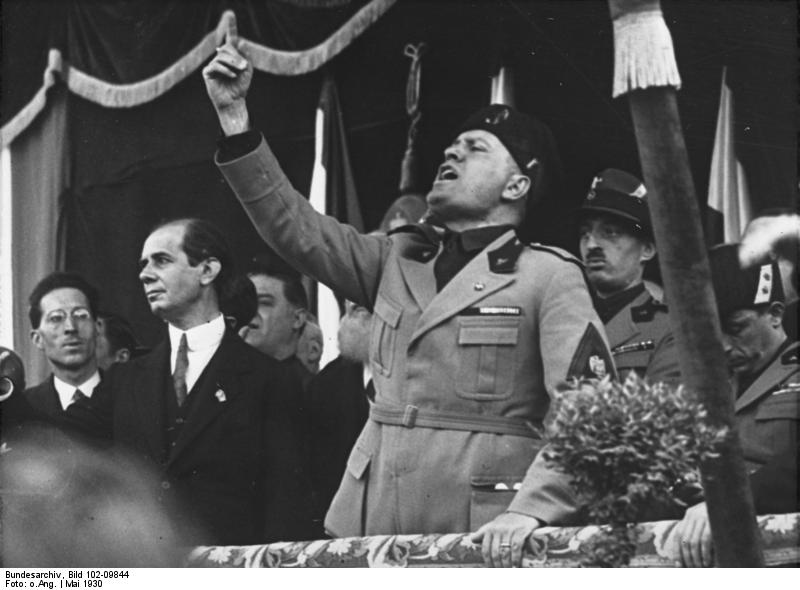
The underlaying problem was that Mussolini had imposed on Italy such a highly personal style of goverment that he had in effect , become the Fascist State itself. At the outbreak of the war he bolstered his already far-flung authority by naming himself Commander in Chief of Italian Armed Forces ,a title constitutionally reserved for the King. In areas where Mussolini was unwilling or unable to exert his personal power , there was no other alternate authority to ensure the orderly conduct of the goverment. And as the Duce’s own judgment became increasingly erratic , so did the course steered by party bureaucracy schooled in dictum that was emblazoned on homes and publi buildings all over Italy : “Mussolini is always right”
Although veteran Fascist notables complained to him about confusion and lack of direction in the ranks , Mussolini rejected all suggested reforms , believing that a certain amount of turmoil helped secure his own supreme authority. For same reason , he was reluctant to delegate power to anyone with proven ability or too popular.”As soon as he sees too much light shining on us” remarked Fascist avitaion hero Italo Balbo “he turns off the switch” Another Fascist veteran Giuseppe Bottai noted that Mussolini was so wary of any sign of concerted action on the part of his subordinates that he proceededon the assumption “If three ministries agree on a subject , it is a conspiracy”
By the time Italy entered the war in June 1940 , the elected national legislature had been replaced by an appointed chamber heavily loaded with Fascists. This rubber stamp legislature was largely ignored by Mussolini , as were the traditional Council of Ministers and so called Grand Council of Fascism which had been set up in 1920’ies as a kind of shadow cabinet as highest governing body of the state. In practice though ther Grand Council and the Council of Ministers were summoned only intermittenly by Mussolini , who used them as soundingf boardswhen he wanted to think out loud.
The Grand Counil , which consisted of 20 of the Fascist elite rarely conveyed before midnight and seldom adjourned before dawn. Mussolini conducted these nocturnal sessions as he would a high school civics class. First the roll was called , with each member shouting “Present!” in a loud voice. Then the meeting is thrown open into discussion which usually consisted of a harangue by Mussolini sometimes lasting as long as three hours. When Duce felt the need to pause he would rise up abrubtly and say ”This meeting is adjourned , go smoke a cigarette” At the buffet outside the meeting room , the Council members would find the black uuniformed moschettieri , the Duce’s personal bodyguards , each wearing a skull and crossbones insignia on their fez , a dagger at their belt and a carbine slung on their shoulder.
At Mussolini’s insistence , no minutes were ever kept , nor any votes taken at the sessions of Grand Council or Council of Ministers. Thus the official records of their proceedings were incomplate and unreliable. Mussolini usually ignored the agenda of the day and in accustomed fashion , started rambling over a wide range of topics as they came to mind. When one minister began to take notes once , Mussolini snapped “Do not do so. You can see the even the Secretary of Council is keeping no records , on my orders because I want to talk freely and I can do so only in this body , which alone can keep a secret.”
The real business of goverment went on in the Duce’s cavernous office in Palazzo Venezia. This imposing structure which was built in the 15th Century of massive stones transported from Coliseum , appealed to Mussolini’s love of the theatrical and his yearning to anricent Roman past. Its balconies over Piazza Venetia suggested a grandeur Mussolini felt Fascism often lacked.
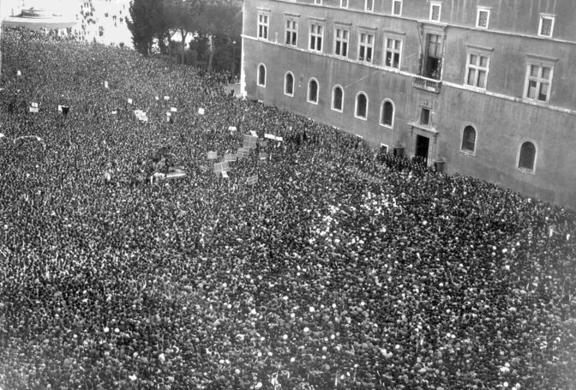
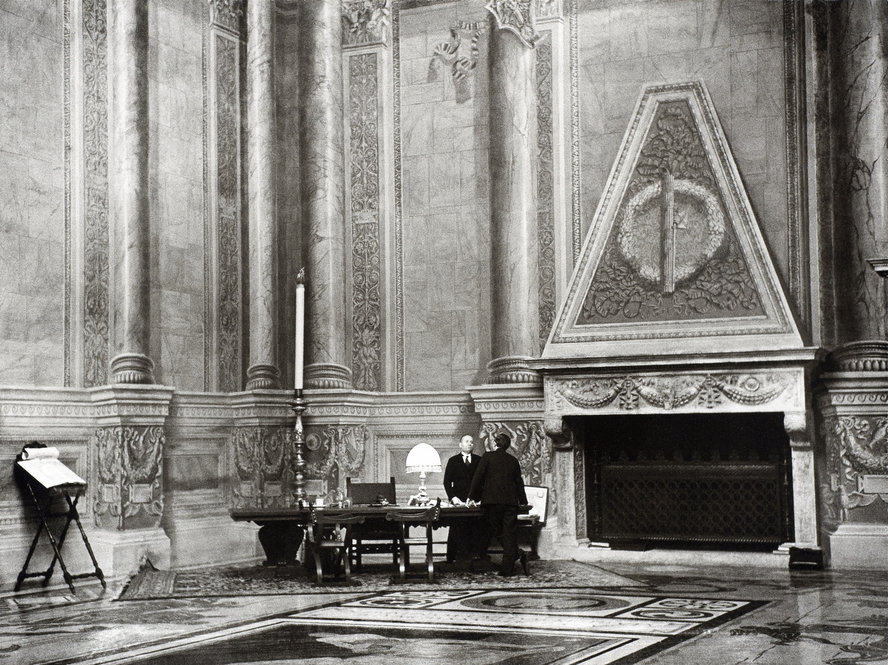
Here in his office (a 60 feet long and 40 feet high gallery called Hall of Globe with a 13 foot desk (in which he kept loose change to hand out to petitioners and a pistol for self defence) Mussolini received his visitors , starting 09:30 AM in every morning. The room and 13 foot desk was situated so Mussolini established a psychological dominance over his guests by remaining seated while visitors (high ranking officials or military officers like generals , admirals) made the long walk from his office door to his desk under Mussolini’s penetrating stare before snapping to attention and give Fascist salute to Il Duce. When he wished , Mussolini could be very impressive in personal interviews. A fast reader with a good memory from his youth , he gave impression of knowing far more than he did. On the other hand he enjoyed playing petty tyrant and distrupting the audience before conversation even began. Often the hangers-on outside his office could hear his angry shouts as he dismissed some luckless official who had offended because his shoes squeaked on the stone floor or Mussolini disliked cut of his beard. He had a calculated way of scowling and of fixing a visitor with his famous “magnetic look” which intimidated even most courageous of his collegues and made a balanced dialogue all but impossible.
Every morning Mussolini saw the chief of carabinieri or national military police and chiefs of political and criminal poliçe. He also met with Foreign Minister Count Ciano (who was also his son in law) and Ministers of Interior and Popular Culture (Propaganda) He read war bulletins , Foreign Office telegrams , General Staff reports and reports from regional Fascist officials. Much of the rest of his time he gave private audiences , read newspapers and Secret Service reports.
He read newspapers with eye of a professional journalist , issued instructions to editors , judged the covers of magazines submitted for his approval , and he examined every official photograph he appeared in to determine which should be released to press ! He even wrote headlines ,using words that had a reounding ring but that usually bore little relation to reality. Thus in July 1940 after Naval Action off Calabria when Royal Navy battleship HMS Warspite damaged Italian battleship Cesare and afterwards Italian planes accidently attacked Italian ships but left both sides unscarred , Mussolini unabashedly composed a headline for release : “We Sunk 50 Per Cent of British Navy in Three Days !”
Although Mussolini spent long hours in his office , he did very little substantial administrative work while there. Part of Duce’s trouble was his fascination with trivia , over which he felt he could exert some measurable control. Hence during summer of 1940 , when he should have been concerning himself with critical military matters , he worried instead about the date on which the Roman traffic police should switch to their white summer uniforms and when military band on Lido at Venice should begin its schedule of summer concerts. Count Ciano later complained bitterly that the Duce was so obsessed with detail that he could not or would not see the disastrous condition of Italy’s armed forces.
